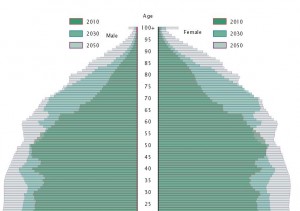
The word OLD - ELDERLY has shifted. At first I thought it was because I was (am) getting older. But I found out, it’s not.
We know that by 2030 about 20% of the United States will be in that “Certain Age” category. And there will be more people in that category than before. (That’s only 15 years away!)
The terms have changed because as a group, in general, we are living longer. So “old” is “older” than it used to be.
Why don’t I use the term elderly, senior or even retired? Because the terms have shifted. People don’t necessarily retire at 62. And what used to be considered entirely appropriate has changed. The facts have changed!
- In the early 1900’s babies born, life expectancy: 48 years old
- By 1928’s to the early 30’s when the depression era babies were born, life expectancy: 60
- Social security was established in 1935 (but they insist that at age 65 when benefits would be paid, had nothing to do with the life expectancy at birth. They say that people reaching 65 have/had a life expectancy of another 13 years.)
- In 1957 at the peak of the baby boom babies were born, life expectancy was 70 ish
- When the millennials/echo boom babies were born, life expectancy: 77.
- And the people in Generation Z (is that even this cohort’s name?) who are being born now, will expect to live to 80 or more.
No wonder no one knows what the term elderly actually means! (does it mean someone more frail, difficulty walking and who needs mid-day naps? Or is elderly actually an age?)
Where you were born as well as how long you have lived (the longer you live, the more your life expectancy increases) both make a big difference in how long you will live.
Silver is used as a code word: “silver sneakers” (although it’s not just for “older” adults. “silver tsumani” refers to the aging workforce where 25% will be over 55 in 5 years. Maybe silver refers to the hair color?
I thought that the word “silver” was used because the silver anniversary is at 50, but that’s actually the Gold anniversary. (The silver anniversary is 25 years!) Gold and golden are also used as in the “Golden Buckeye” card for those 60 and older in Ohio. (And 60 is the diamond anniversary!)
You can see why it gets confusing for marketing terms.
The New York Times in 1998 calls it “Junior-Seniors” “Near elderly” are people ages 40 to 60? (So I guess that makes 60 elderly?)
How do you describe an exercise class for a “certain age” age group. As marketers, we’re always trying to describe groups of people. Active seniors or active adults. What do you picture? Stereotyping people can be offensive at best, but really bad when you pick an unflattering term.
So we need a way to describe this marketing group that doesn’t offend. Why are people so touchy? In part because the words elderly, old, and senior citizens- even retired! - were used describe someone of a different age bracket and “life expectancy for Americans jumped from 47 to 71..”
Stereotyping a group of people for marketing is always hard not to offend. Adding a positive adjective can help, but not solve the challenge. Active senior for example. As a marketer, I know what that means, but if I’m thinking of that term as it relates to myself, I think of an active senior as what I was in my last year of college/high school… Maybe mature? Experienced?
Unfortunately, it is possible to age without gaining experience or maturity!
The other important point about aging, the older you are, the more likely you will get older. That is, if life expectancy when you were born was 65 and now you are 65, it hasn’t stayed the same number. In simple terms, half would make it to 65 and the other half wouldn’t. And if the Social Security expectation is another 13 years, that means on average half will make it and half won’t another 13 years, right?
Either way, the older I get, the more surprise I get at the term elderly being used to describe someone I think of as a peer. Active aging, strong seniors, older adults
Your thoughts?